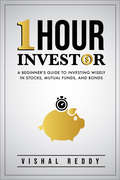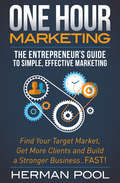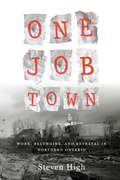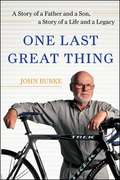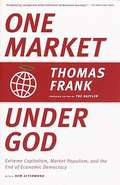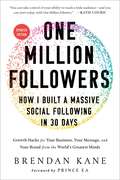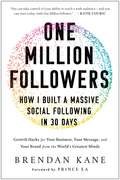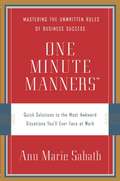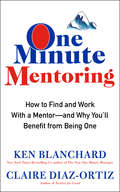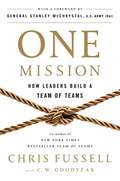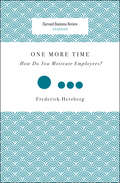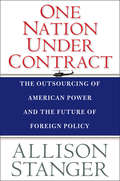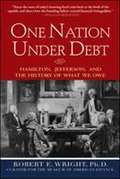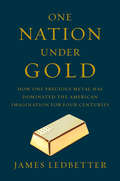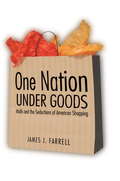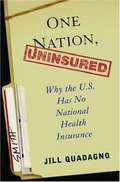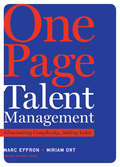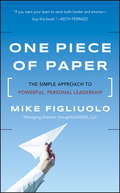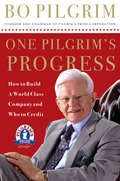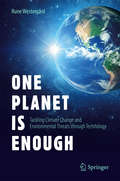- Table View
- List View
One Hour Investor: A Beginner's Guide to Investing Wisely in Stocks, Mutual Funds, and Bonds
by Vishal ReddyGain financial knowledge that could be worth millions over your lifetime—explained in plain English.Does the stock market sound like a foreign language to you? When you see financial experts on television, does their nonstop jargon just fly over your head? Do you wish you understood how the stock market works so you could make money, too? Well, your wish has been granted!How can regular folks create real wealth and financial freedom? It’s simple: focus on the fundamentals. If you don’t learn the fundamentals of managing your investments, you’ll never be able to create the kind of wealth that will give you a secure retirement.That’s where One Hour Investor can help. You’ll discover a lifetime of financial knowledge—in just one hour. You can learn the basics of investing for long-term financial success, whether you want to know about stocks, bonds, mutual funds, IRAs, or 401(k)s, and whether you’re just starting out or you’re a senior who wants a steady stream of income. One Hour Investor covers all sorts of financial instruments as well as basic financial concepts. You don’t need to have an MBA to understand how to succeed financially. It’s all laid out for you in plain English so you can easily understand how each investment works for you.It’s time to stop worrying about your financial future and do something about it! One Hour Investor is the quick and easy beginner’s guide to investing.
One Hour Marketing: The Entrepreneur's Guide to Simple, Effective Marketing
by Herman Pool&“Communicates very complicated ideas in a very simple manner&” (Jay Conrad Levinson, author of Guerrilla Marketing). Who says marketing has to takes weeks or months—or even hours—to plan and execute? All you need is sixty minutes, an open mind, and One Hour Marketing. If you&’ve been running your business on empty because marketing seemed too confusing, too difficult, or too time-consuming, relax. One Hour Marketing tells you what you need to know to make your marketing work—fast! In a book you can read in one hour, Herman Pool shows you why marketing works, and how you can build a plan in an hour, then execute it without huge time commitments. Read this book and you will: * learn what steps to take to make your marketing work * discover how to identify your ideal target market to make sales easier * build an actionable marketing plan quickly * understand the essential methods and tools you need to succeed You&’ll even learn the secrets to getting the work done—without having to do the work yourself.
One Job Town: Work, Belonging, and Betrayal in Northern Ontario
by Steven HighThere’s a pervasive sense of betrayal in areas scarred by mine, mill and factory closures. Steven High’s One Job Town delves into the long history of deindustrialization in the paper-making town of Sturgeon Falls, Ontario, located on Canada’s resource periphery. Much like hundreds of other towns and cities across North America and Europe, Sturgeon Falls has lost their primary source of industry, resulting in the displacement of workers and their families. One Job Town takes us into the making of a culture of industrialism and the significance of industrial work for mill-working families. One Job Town approaches deindustrialization as a long term, economic, political, and cultural process, which did not begin and simply end with the closure of the local mill in 2002. High examines the work-life histories of fifty paper mill workers and managers, as well as city officials, to gain an in-depth understanding of the impact of the formation and dissolution of a culture of industrialism. Oral history and memory are at the heart of One Job Town, challenging us to rethink the relationship between the past and the present in what was formerly known as the industrialized world.
One Last Great Thing: A Story of a Father and a Son, a Story of a Life and a Legacy
by John BurkeA powerful, honest, and inspiring tribute to the incredible life of Richard Burke, the founder of Trek Bicycle Corporation, written by his son John.Richard Burke, known to many as "The Big Guy," was a legend. With his friend Bevil Hogg, he founded the Trek Bicycle Corporation in 1976 and then went on to establish the company as one of the leading bicycle companies in the world. He was a man who called his son, John, his best friend. Indeed, they did many great things together: ran the Boston Marathon, followed the Tour de France throughout France, and later ran Trek together. In March 2008, he passed away after complications of heart surgery. The Big Guy touched people's lives in countless ways, and his passing was deeply emotional for many. Now John (current president of Trek Bicycle) has written a powerful tribute to the incredible life his father led and the ways in which he was an inspiring businessman, leader, and person. Taking readers deep into the history of Trek, John shares how his father taught, trained, and instilled in him the confidence and desire to be a leader. A portrait of a great man, the book culminates with John telling his father on his deathbed of their twenty greatest moments together. This is an intimate portrayal of a father-son relationship filled with poignant experiences and lessons on how to get the most out of life.
One Life; One Love (A)
by Kerry Herman Thomas J. DeLongKatie Hood, CEO of the One Love Foundation (One Love), a group dedicated to the prevention of relationship violence, had grown the organization's base of funding support to $6 million by 2017 and broadened its mandate to include relationships across many demographics. But questions about how best to deploy their funding loomed, as well as divergent views on the pace of growth the organization should target. One Love also needed to develop better metrics by which to measure its success. This case explores Hood's plan of action as she aims to bring One Love to greater scale.
One Life; One Love (B)
by Kerry Herman Thomas J. DeLongSupplement to (A) case. Katie Hood, CEO of the One Love Foundation (One Love), a group dedicated to the prevention of relationship violence, had grown the organization's base of funding support to $6 million by 2017 and broadened its mandate to include relationships across many demographics. But questions about how best to deploy their funding loomed, as well as divergent views on the pace of growth the organization should target. One Love also needed to develop better metrics by which to measure its success. This case explores Hood's plan of action as she aims to bring One Love to greater scale.
One Market Under God: Extreme Capitalism, Market Populism, and the End of Economic Democracy
by Thomas FrankAt no other moment in history have the values of business and the corporation been more nakedly and arrogantly in the ascendant. Combining popular intellectual history with a survey of recent business culture, Thomas Frank traces an idea he calls 'market populism' - the notion that markets are, in some transcendent way, identifiable with democracy and the will of the people. The idea that any criticism of things as they are is elitist can be seen in management literature, where downsizing and ceaseless, chaotic change are celebrated as victories for democracy; in advertising, where an endless array of brands seek to position themselves as symbols of authenticity and rebellion; on Wall street, where the stock market is identified as the domain of the small investor and common man; and in the right-wing politics of the 1990s and the popular theories of Tom Peters, Charles Handy and Thomas Friedman. One Market Under God is Frank's counterattack against the onslaught of market propaganda. Mounted with the weapons of common sense it is lucid and tinged with anger, betrayal and a certain hope for the future.
One Million Followers, Updated Edition: How I Built a Massive Social Following in 30 Days
by Brendan KaneOver 60 billion online messages are sent on digital platforms every day, and only a select few succeed in the mad scramble for customer attention. This means that the question for anyone who wants to gain mass exposure for their transformative content, business, or brand or connect with audiences around the globe is no longer if they should use social media but how to best take advantage of the numerous different platforms. How can you make a significant impact in the digital world and stand out among all the noise? Digital strategist and "growth hacker" Brendan Kane has the answer and will show you how—in 30 days or less. A wizard of the social media sphere, Kane has built online platforms for A-listers including Taylor Swift and Rihanna. He's advised brands such as MTV, Skechers, Vice and IKEA on how to establish and grow their digital audience and engagement. Kane has spent his career discovering the best tools to turn any no-name into a top influencer simply by speaking into a camera or publishing a popular blog—and now he'll share his secrets with you. In One Million Followers, Kane will teach you how to gain an authentic, dedicated, and diverse online following from scratch; create personal, unique, and valuable content that will engage your core audience; and build a multi-media brand through platforms like Facebook, Instagram, YouTube, Snapchat, and LinkedIn. Featuring in-depth interviews with celebrities, influencers, and marketing experts, including: Chris Barton, cofounder and board director of Shazam and former head of Android business development for Google Ray Chan, CEO and cofounder of 9GAG Julius Dein, internet personality and magician with nearly 16 million Facebook followers Mike Jurkovac, Emmy Award–winner and creative director of will.i.am and the Black Eyed Peas Phil Ranta, former COO of Studio71 and VP of network at Fullscreen Eamonn Carey, managing director at Techstars London Jonathan Skogmo, founder and CEO of Jukin Media, Inc. Jon Jashni, founder of Raintree Ventures and former president and chief creative officer of Legendary Entertainment One Million Followers is the ultimate guide to building your worldwide brand and unlocking all the benefits social media has to offer. It's time to stop being a follower and start being a leader.
One Million Followers: How I Built a Massive Social following in 30 Days: Growth Hacks for Your Business, Your Message, and Your Brand from the World's Greatest Minds
by Brendan KaneDigital strategist and “growth hacker” Brendan Kane has the answer and will show you how—in 30 days or less. <P><P>A wizard of the social media sphere, Kane has built online platforms for A-listers including Taylor Swift and Rihanna. He’s advised brands such as MTV, Skechers, Vice and IKEA on how to establish and grow their digital audience and engagement.
One Minute Manners™
by Ann Marie SabathWhat makes the difference between an ordinary professional and an extraordinary one? A mastery of business manners. That’s why Ann Marie Sabath’s pocket-sized guide to business etiquette emergencies is indispensable for new hires and college graduates just starting out, as well as a valuable tool for career veterans looking to add finesse to their workplace repertoire. Unlike typical business etiquette manuals which run over with irrelevant advice,One Minute Mannersis the source for quick solutions to...
One Minute Mentoring: How to Find and Work With a Mentor--And Why You'll Benefit from Being One
by Ken Blanchard Claire Diaz-OrtizThe bestselling co-author of the legendary The One Minute Manager® and a former Twitter executive join forces to create the ultimate guide to creating powerful mentoring relationships.While most people agree that having a mentor is a good thing, they don’t know how to find one or use one. And despite widespread approval for the idea of being a mentor, most people don’t think they have the time or skills to do so.Positive mentoring relationships can change the way we lead and help us succeed. In One Minute Mentoring, legendary management guru Ken Blanchard and Claire Diaz-Ortiz, a former Twitter executive and early employee, combine their knowledge to provide a systematic approach to intergenerational mentoring, giving readers great insight into the power and influence of mentoring and encouraging them to pursue their own mentoring relationships. Using his classic parable format, Blanchard explains why developing effective communication and relationships across generations can be a tremendous opportunity for companies and individuals alike. One Minute Mentoring is the go-to source for learning why mentoring is the secret ingredient to professional and personal success.
One Mission: How Leaders Build a Team of Teams
by General Stanley Mcchrystal Chris Fussell C. W. GoodyearFrom the co-author of the New York Times bestseller Team of Teams, a practical guide for leaders looking to make their organizations flatter and more interconnected. Too often, companies end up with teams stuck in their own silos, pursuing goals and metrics in isolation. Their traditional autocratic structures create stability, scalability, and predictability -- but in a world that demands constant adaptation, this traditional model fails. In Team of Teams, retired four-star General Stanley McChrystal and former Navy SEAL Chris Fussell made the case for a new organizational model combining the agility, adaptability, and cohesion of a small team with the power and resources of a giant organization. Now, in One Mission, Fussell channels all his experiences, both military and corporate, into powerful strategies for unifying isolated and distrustful teams. This practical guide will help leaders in any field implement the Team of Teams approach to tear down their silos, improve collaboration, and avoid turf wars. By committing to one higher mission, organizations develop an overall capability that far exceeds the sum of their parts. From Silicon Valley software giant Intuit to a government agency on the plains of Oklahoma, organizations have used Fussell’s methods to unite their people around a single compelling vision, resulting in superior performance. One Mission will help you follow their example to a more agile and resilient future.
One Money, One Market--A Revised Benchmark
by Christian Henn Theo S. EicherA report from the International Monetary Fund.
One More Time: How do You Motivate Employees? (Harvard Business Review Classics)
by Frederick HerzbergIt's a manager's perennial question: 'How do I get an employee to do what I want?' The psychology of motivation is very complex, but the surest way of getting someone to do something is to deliver a kick in the pants - put bluntly, the KITA. This book argues that an employee with an internal generator needs no KITA.
One Nation Under Contract: The Outsourcing of American Power and the Future of Foreign Policy
by Allison StangerInternational relations scholar Allison Stanger shows how contractors became an integral part of American foreign policy, often in scandalous ways--but also maintains that contractors aren't the problem; the absence of good government is. Outsourcing done right is, in fact, indispensable to America's interests in the information age. Stanger makes three arguments. The outsourcing of U. S. government activities is far greater than most people realize, has been very poorly managed, and has inadvertently militarized American foreign policy; Despite this mismanagement, public-private partnerships are here to stay, so we had better learn to do them right; With improved transparency and accountability, these partnerships can significantly extend the reach and effectiveness of U. S. efforts abroad. The growing use of private contractors predates the Bush Administration, and while his era saw the practice rise to unprecedented levels, Stanger argues that it is both impossible and undesirable to turn back the clock and simply re-absorb all outsourced functions back into government. Through explorations of the evolution of military outsourcing, the privatization of diplomacy, our dysfunctional homeland security apparatus, and the slow death of the U. S. Agency for International Development, Stanger shows that the requisite public-sector expertise to implement foreign policy no longer exists. The successful activities of charities and NGOs, coupled with the growing participation of multinational corporations in development efforts, make a new approach essential. Provocative and far-reaching,One Nation Under Contractpresents a bold vision of what that new approach must be.
One Nation Under Debt: Hamilton, Jefferson, and the History of What We Owe
by Robert E. WrightLike its current citizens, the United States was born in debt-a debt so deep that it threatened to destroy the young nation. Thomas Jefferson considered the national debt a monstrous fraud on posterity, while Alexander Hamilton believed debt would help America prosper. Both, as it turns out, were right. <p><p> One Nation Under Debt explores the untold history of America's first national debt, which arose from the immense sums needed to conduct the American Revolution. Noted economic historian Robert Wright, Ph.D. tells in riveting narrative how a subjugated but enlightened people cast off a great tyrant-“but their liberty, won with promises as well as with the blood of patriots, came at a high price.” He brings to life the key events that shaped the U.S. financial system and explains how the actions of our forefathers laid the groundwork for the debt we still carry today. <p> As an economically tenuous nation by Revolution's end, America's people struggled to get on their feet. Wright outlines how the formation of a new government originally reduced the nation's debt-but, as debt was critical to this government's survival, it resurfaced, to be beaten back once more. Wright then reveals how political leaders began accumulating massive new debts to ensure their popularity, setting the financial stage for decades to come. <p> Wright traces critical evolutionary developments-from Alexander Hamilton's creation of the nation's first modern capital market, to the use of national bonds to further financial goals, to the drafting of state constitutions that created non-predatory governments. He shows how, by the end of Andrew Jackson's administration, America's financial system was contributing to national growth while at the same time new national and state debts were amassing, sealing the fate for future generations.
One Nation Under Gold: How One Precious Metal Has Dominated The American Imagination For Four Centuries
by James LedbetterOne Nation Under Gold examines the countervailing forces that have long since divided America—whether gold should be a repository of hope, or a damaging delusion that has long since derailed the rational investor. Worshipped by Tea Party politicians but loathed by sane economists, gold has historically influenced American monetary policy and has exerted an often outsized influence on the national psyche for centuries. Now, acclaimed business writer James Ledbetter explores the tumultuous history and larger-than-life personalities—from George Washington to Richard Nixon—behind America’s volatile relationship to this hallowed metal and investigates what this enduring obsession reveals about the American identity. Exhaustively researched and expertly woven, One Nation Under Gold begins with the nation’s founding in the 1770s, when the new republic erupted with bitter debates over the implementation of paper currency in lieu of metal coins. Concerned that the colonies’ thirteen separate currencies would only lead to confusion and chaos, some Founding Fathers believed that a national currency would not only unify the fledgling nation but provide a perfect solution for a country that was believed to be lacking in natural silver and gold resources. Animating the "Wild West" economy of the nineteenth century with searing insights, Ledbetter brings to vivid life the actions of Whig president Andrew Jackson, one of gold’s most passionate advocates, whose vehement protest against a standardized national currency would precipitate the nation’s first feverish gold rush. Even after the establishment of a national paper currency, the virulent political divisions continued, reaching unprecedented heights at the Democratic National Convention in 1896, when presidential aspirant William Jennings Bryan delivered the legendary "Cross of Gold" speech that electrified an entire convention floor, stoking the fears of his agrarian supporters. While Bryan never amassed a wide-enough constituency to propel his cause into the White House, America’s stubborn attachment to gold persisted, wreaking so much havoc that FDR, in order to help rescue the moribund Depression economy, ordered a ban on private ownership of gold in 1933. In fact, so entrenched was the belief that gold should uphold the almighty dollar, it was not until 1973 that Richard Nixon ordered that the dollar be delinked from any relation to gold—completely overhauling international economic policy and cementing the dollar’s global significance. More intriguing is the fact that America’s exuberant fascination with gold has continued long after Nixon’s historic decree, as in the profusion of late-night television ads that appeal to goldbug speculators that proliferate even into the present. One Nation Under Gold reveals as much about American economic history as it does about the sectional divisions that continue to cleave our nation, ultimately becoming a unique history about economic irrationality and its influence on the American psyche.
One Nation Under Goods
by James J. FarrellLoved and hated, visited and avoided, seemingly everywhere yet endlessly the same, malls occupy a special place in American life. What, then, is this invention that evokes such strong and contradictory emotions in Americans? In many ways malls represent the apotheosis of American consumerism, and this synthetic and wide-ranging investigation is an eye-popping tour of American culture's values and beliefs. Like your favorite mall, One Nation under Goods is a browser's paradise, and in order to understand America's culture of consumption you need to make a trip to the mall with Farrell. This lively, fast-paced history of the hidden secrets of the shopping mall explains how retail designers make shopping and goods "irresistible." Architects, chain stores, and mall owners relax and beguile us into shopping through water fountains, ficus trees, mirrors, and covert security cameras. From food courts and fountains to Santa and security, Farrell explains how malls control their patrons and convince us that shopping is always an enjoyable activity. And most importantly, One Nation Under Goods shows why the mall's ultimate promise of happiness through consumption is largely an illusion. It's all here--for one low price, of course.
One Nation, Uninsured: Why The U.s. Has No National Health Insurance
by Jill S. QuadagnoEvery industrial nation in the world guarantees its citizens access to essential health care services--every country, that is, except the United States. In fact, one in eight Americans--a shocking 43 million people--do not have any health care insurance at all. One Nation, Uninsured offers a vividly written history of America's failed efforts to address the health care needs of its citizens. Covering the entire twentieth century, Jill Quadagno shows how each attempt to enact national health insurance was met with fierce attacks by powerful stakeholders, who mobilized their considerable resources to keep the financing of health care out of the government's hands. Quadagno describes how at first physicians led the anti-reform coalition, fearful that government entry would mean government control of the lucrative private health care market. Doctors lobbied legislators, influenced elections by giving large campaign contributions to sympathetic candidates, and organized "grassroots" protests, conspiring with other like-minded groups to defeat reform efforts. As the success of Medicare and Medicaid in the mid-century led physicians and the AMA to start scaling back their attacks, the insurance industry began assuming a leading role against reform that continues to this day. One Nation, Uninsured offers a sweeping history of the battles over health care. It is an invaluable read for anyone who has a stake in the future of America's health care system.
One Page Talent Management
by Marc Effron Miriam OrtA Revolutionary Approach to Talent ManagementYou know that winning in today's marketplace requires top quality talent. You also know what it takes to build that talent-and you spend significant financial and human resources to make it happen. Yet somehow, your company's beautifully designed and well-benchmarked processes don't translate into the bottom-line talent depth you need. Why?Talent management experts Marc Effron and Miriam Ort argue that companies unwittingly add layers of complexity to their talent building models-without evaluating whether those components add any value to the overall process. Consequently, simple processes like setting employee performance goals become multi-page, headache-inducing time-wasters that turn managers off to the whole process and fail to improve results.In this revolutionary book, Effron and Ort introduce One Page Talent Management (OPTM): a powerfully simple approach that significantly accelerates a company's ability to develop better leaders faster. The authors outline a straightforward, easy-to-use process for designing results-oriented OPTM processes: base every process on proven scientific research; eliminate complexity by including only those components that add real value to the process; and build transparency and accountability into every practice.Based on extensive research and the authors' hands-on corporate and consulting experience with companies including Avon Products, Bank of America, and Philips, One Page Talent Management shows how to: Quickly identify high potential talent without complex assessments Increase the number of "ready now" successors for key roles Generate 360 feedback that accelerates change in the most critical behaviors Significantly reduce the time required for managers to implement talent processes Enforce accountability for growing talent through corporate culture, compensation, etc.A radical new approach to growing talent, One Page Talent Management trades complexity and bureaucracy for simplicity and a relentless focus on adding value to create the high-quality talent you need-right now.
One Piece of Paper
by Mike FigliuoloA robust, authentic model for creating and clearly articulating a personal leadership philosophyBased on leadership expert Mike Figliuolo's popular "Leadership Maxims" training course, One Piece of Paper teaches decisive, effective leadership by taking a holistic approach to defining one's personal leadership philosophy. Through a series of simple questions, readers will create a living document that communicates their values, passions, goals and standards to others, maximizing their leadership potential.Outlines a clear approach for identifying a concise and meaningful set of personal leadership maxims by which leaders can live their lives Explains and applies four basic aspects of leadership: leading yourself, leading the thinking, leading your people, and leading a balanced lifeGenerates a foundational document that serves as a touchstone for leaders and their teamsSimple, applicable, and without pretense, One Piece of Paper provides a model for real leadership in the real world.
One Pilgrim's Progress
by Lonnie PilgrimBo Pilgrim had no college education, but he did have a big dose of Texas courage and a heavenly calling that led him to start his own business after World War II. Reggie Wallace, who worked with Pilgrim for fifty years, describes it this way: "All we had in the beginning was a two-wheel buggy, a shovel, some burlap sacks, and Bo's big ideas." Today, Pilgrim's Pride is a multi-billion-dollar enterprise that employs more than 40,000 people and processes 30 million chickens a week. In One Pilgrim's Progress, Pilgrim shares the essential values he learned as a boy that are the foundation of his business success.
One Plan at a Time: How Our Mental Processes Increase the Likelihood of Making Flawed Decisions
by Sydney Finkelstein Jo Whitehead Andrew CampbellIf our brains naturally questioned and challenged our assessments and judgments or compared multiple solutions to a problem, we would be much better at spotting errors in our thinking and correcting them. But we do not. We have evolved a brain that assesses the situation, comes up with a plan of action, and then evaluates that plan. We do not consider alternative unless we imagine that our first plan won't work. The authors describe this process as "one-plan-at-a-time decision making" and in this chapter, they explain why this mental habit increases the likelihood of making flawed decisions. This chapter was originally published as chapter 4 of "Think Again: Why Good Leaders Make Bad Decisions and How to Keep It From Happening to You."
One Planet Is Enough
by Rune WestergårdThe present book offers a compelling sketch of how technological advances have shaped humankind’s evolution and how they can unlock ways to combat climate change and environmental threats. It also reveals new perspectives on climate change and sustainable development by harnessing technology.Given today’s conditions, only a homeless vegan could achieve a sustainable ecological footprint. In reality, it would be impossible, and even destructive, to attempt to save the planet by discontinuing consumption. It would disrupt evolution and threaten the driving forces of the technology that is our hope for combating climate change and environmental threats in the future. This is the opinion of Rune Westergård, engineer, entrepreneur, and environmental debater, with several decades of experience from the field of environmental and energy technology. He challenges many established truths on consumption and sustainability and demonstrates how and why they are flawed. From his point of view, both continued global growth and increased welfare are entirely possible within the ecological limitations of our planet. Once we learn to put technology to our best advantage, one planet will be enough.
